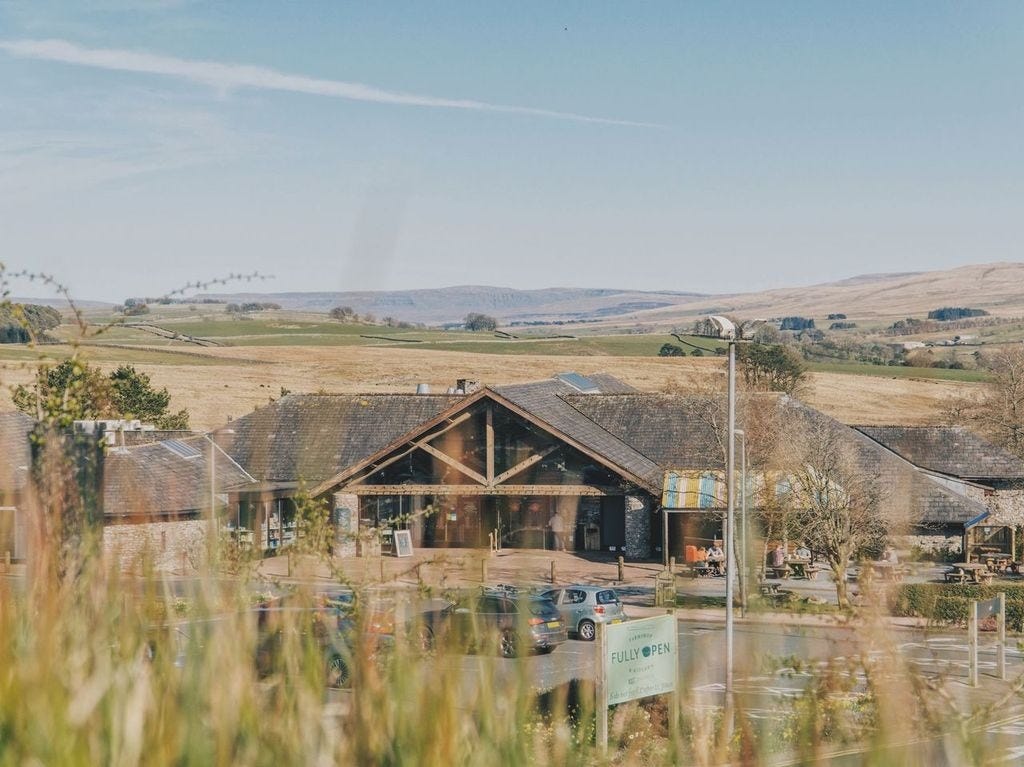Hefted newsletter #11: June 2025
Despatches from Cumbria and the Lake District, from the team at Countrystride and Inspired by Lakeland
In this month’s news round-up: the biggest change to nature laws in a decade; should Lakeland’s UNESCO designation be revoked?; wildfires and fly-camping; a three-and-half hour bus trip between Brockhole and Elterwater; no zoo for Tebay; sheep on the roof… and a 10mph police pursuit that ended in jail.
The gather: Pick of the Cumbrian headlines
Bassenthwaite Lake and Borrowdale’s temperate rainforest are among the special areas of conservation (SACS) whose protection could be threatened by the Planning and Infrastructure Bill, which passed its third reading in Parliament earlier this week. Amendments to strengthen nature protections in England had been drawn up before Tuesday’s Commons vote on the bill, according to The Guardian, but following an intervention by Downing Street and the Treasury, they never appeared. The RSPB and Wildlife Trusts have called for Part 3 of the bill to be scrapped because it allows developers to sidestep environmental obligations by paying into a nature restoration fund that may be drawn from at a later date elsewhere – a levy dubbed “cash to trash”. The Campaign for National Parks said the bill, if enacted, would be “the biggest change to nature law in England for decades”, bulldozing protections for Sites of Special Scientific Interest, SACS and Ramsar [wetland] sites, which include Esthwaite Water and the Duddon Estuary.
Is UNESCO World Heritage status good for the Lake District? Not according to campaigners calling for it to be revoked on the grounds that it promotes unsustainable sheep farming, works against nature restoration, promotes overtourism and isn’t wanted by residents. Lee Schofield, naturalist and author of Wild Fell (we interviewed him in Countrystride #76), wrote in a letter to UNESCO last month that “the primary focus of the designation is to preserve sheep farming, a practice which is both ecologically catastrophic and economically precarious”. World Heritage status is also being used by ‘nimbys’ to “lobby against progressive change for nature recovery”, according to David Morris of the RSPB. Their arguments chime with George Monbiot’s warning in 2017 that World Heritage status would be “a disaster” for the Lake District. Dissenting voices, including Professor Jane Barker – farmer and co-founder of Dalefoot Composts – said farming within a World Heritage site was “perfectly compatible with net zero, climate change, biodiversity and water quality”. More from The Guardian.
Environmentalist George Monbiot has used his latest Guardian column to highlight another challenge to upland biodiversity: the ongoing spread of Molinia caerulea. A mix of factors, from degraded peat to historic overgrazing, may be responsible for the little-studied expansion of purple moor-grass, which is creating monocultures devoid of wildlife and tussocky “deserts” inaccessible to walkers. More from The Guardian.
It’s not all bad news, though. On the Howgills, hill farmers and landscape restorers are showing how collaboration can benefit nature. Twelve years into a major restoration project that has seen 300,000 native trees planted on hillsides once nibbled by sheep, birds, insects and flowers are returning, and farmers are reaping the financial rewards. More from The Guardian.
A reminder that even though Countrystride is taking a break, there are still a handful of tickets left to this summer’s Countrystride Live boutique gathering at Verey Books, Pooley Bridge, on Wednesday 18 June. Dave will be interviewing Jack Cornish, Director of England at the Ramblers, about his book The Lost Paths – an exploration of the deep history of English and Welsh paths, and how this millennia-old network was created, has evolved, and been transformed. There will be plenty of Cumbrian path chat. See you there! More details at Countrystride.
Happy 100th birthday Crow Park! The anniversary of the Derwent Water beauty spot’s donation to the National Trust by Sir John and Lady Randles “to look after on behalf of the nation” was an opportunity to celebrate the viewpoint’s role in the early days of environmentalism. It is believed that when poet Thomas Gray wrote about the felling of Crow Park’s ancient oak trees in his 1769 Journal of a Visit to the Lake District, he created the first written record of an environmental protest, leading indirectly to the Trust’s later foundation. More from the BBC.
“Horrifying” damage to wildlife and habitats caused by a fire at Silloth beach could take up to 20 years to recover. Solway Coast National Landscape said two football pitches’ worth of “some of the best dune systems in the North West” had been blackened by the wildfire, which happened at “the worst time of year”. Days after the Silloth blaze, 10 fire crews spent eight hours bringing a wildfire near Warcop at Appleby-in-Westmorland under control, prompting a plea to local residents to keep doors and windows shut as a precaution. More from Cumbria Crack.
Wildfire prevention is a key reason why landowners have been employing secret taskforces to tackle fly-campers. United Utilities (UU) is among those engaging a private security firm to disperse campers who endanger landscapes and wildlife through littering, fire-lighting and tree damage. “It does feel like every fly-camping site has a fire pit in front of it,” said UU’s woodland officer Andrew Wright, adding that anti-social behaviour in the Lake District had reached levels last seen during Covid lockdowns. He said social media was fuelling the problem by heavily promoting particular hotspots. “On Instagram if you search ‘Thirlmere’ nearly every other video is a ‘wild camping’ video.” More from Cumbria Crack.
Could Instagrammers filming their morning dips in Thirlmere’s ‘infinity pool’ be persuaded to put their social media power to good use? The Lake District National Park Authority (LDNPA) thinks so, with £6,000 budgeted for a pilot project to encourage influencers to spread the message to be “Lake District Kind”. Meanwhile a new Keswick community group is offering hikers and wild campers a free drink if they share “kind deeds” – such as litter picking and leaving-no-trace – on Facebook. (How does one prove one has ‘left no trace’? – Ed.)
From infinity pool to community pool, it’s time to don the Speedos as Shap’s open-air pool – the highest in England – opens for its summer season after a £20,000 fundraising campaign. More from the BBC.
Swimming is currently off-limits at YMCA Lakeside on Windermere, where the Environment Agency has warned bathers about a bloom of blue-green algae. Its announcement coincided with the revelation by campaign group Save Windermere that ammonia levels in treated water discharged from Langdale Waste Water Treatment Works upstream of Windermere were high enough to endanger aquatic life – especially when algal blooms were factored in. “Under the right climatic conditions, low flow, high temperatures, and rising pH from let's say an algal bloom, concentrations as low as 7–8 mg per litre … can trigger toxic ammonia levels in rivers, leading to severe fish kills,” said Save Windermere founder Matt Staniek after citizen scientists from Ambleside Action for a Future reported that 70 per cent of their samples exceeded 10mg/l of ammoniacal nitrogen. More from ITV Border.
Panto season is cancelled (Oh, yes it is!) at the Sands Centre in Carlisle, which will remain closed until 2026. Arts leaders are being forced to find alternative venues for the third year running because work to remove 200 tonnes of RAAC (reinforced autoclaved aerated concrete) from the centre’s roof has been delayed due to storm damage. “Young people and old who want to perform – we’ve robbed them of three years of professional training,” said David McNeill of youth theatre specialist StagedRight. Meanwhile, in Barrow, a six-month closure of The Forum to remove asbestos has been extended by two years. More from the BBC.
Former directors of the now-closed South Lakes Safari Zoo – described as the worst zoo in the UK – have had their application to build a new wild animal reserve near Tebay turned down. Yorkshire Dales National Park Authority said unauthorised work had already commenced on the site and instructed the applicants to take remedial action. More from the BBC.
“Lake Windermere” is “the most beautiful spot in Britain” according to a new survey by car insurance company GoShorty. “A World Heritage Site, the Lake District’s spectacular landscape is a must-see on any UK travel bucket list,” according to the insurance company (perhaps making Lee Schofield’s point for him). Windermere beat Cheddar Gorge and Durdle Door into top place. Alarmingly, 33% of respondents to the survey thought Ben Nevis was in Iceland.
Grade II-listed Bootle station has been restored to its former glory. More from Cumbria Crack.
The importance of the £3 bus fare cap has been recognised in a new Cumbria Tourism (CT) survey. It found that 80% of tourism employers worried that the removal of the temporary price cap – currently funded by a Department for Transport grant – would impact on staff members’ ability to get to work. More from the BBC.
With Friends of the Lake District (FLD) awaiting court judgement over its judicial review into the Elterwater zipwire, the campaigning charity has tested the proposed ‘travel plan’ that helped sway planners to greenlight the development. A YouTube video sees staff taking the there-and-back sustainable journey that co-developer Zipworld believes some visitors will use, which involves a car trip, four buses, £29.50 in ticket costs, and a three-and-half hour trip between Brockhole and Elterwater. Head of Campaigns Jeremy Smith ends the
farcevideo by saying: “It’s not a serious or reliable option to use buses to access the site, so everyone’s going to take their car, clogging up Elterwater Common and the roads.”Calling citizen scientists with long memories: West Cumbria Rivers Trust wants to know if you’ve ever seen a water vole. To help realise its ambition to reintroduce the mammal to West Cumbria’s rivers, the charity is asking people to share stories of historic sightings to help it learn where the species – now rare due to habitat loss and predation by American mink – once thrived. More from The Whitehaven News.
A new farm shop and butchery showcasing Cumbrian food is opening in Dalton-in-Furness. Roast Mutton at Killerwick Grange is a sister venue to the Kendal butchers’ shop of the same name, which was crowned Britain’s best butcher in 2023. Owner Robert Unwin grew up on a smallholding, and practises nose-to-tail butchery, sourcing animals from like-minded local farmers. His new shop sells meat processed and dry-aged on the premises alongside bread, charcuterie, preserves and other produce from Cumbrian artisans. More from Cumbria Crack.
Famous for its 50-year-old farm shop, M6 icon Tebay Services has been named the UK’s second-best motorway services – pipped to the top spot in the latest Which? survey by its sister business Gloucester Services. Both service stations are owned and run by the Westmorland Family (we interviewed founder John Dunning back on Countrystride #59), together with Cairn Lodge Services in Lanarkshire, which came fourth. More from Which?.
South of Tebay Services, a proposed four-year closure of M6 junction 38 has enraged locals. Residents of Tebay, Orton, Kirkby Stephen and Grayrigg fear communities will be overrun by diverted motorway traffic when the junction is partially closed to facilitate the replacement of eight motorway bridges in the Lune Gorge. Alongside Tim Farron MP they’re appealing to the Highways Agency to reconsider the closure, due to begin in two years’ time. It has been estimated that local farms and businesses could lose £10 million, with 150 local jobs threatened. More from The Westmorland Gazette.
More 20mph speed limits have been proposed across the county. Westmorland and Furness Council is seeking views on a provisional list of 24 locations, including in parts of Penrith, Kendal, Cartmel, Milnthorpe and Barrow. The consultation closes on July 18. More from the BBC.
A cat has been rescued from a bin. More from the BBC.
RSPB staff have been left “sickened” after two male hen harriers vanished from their nests at Geltsdale Nature Reserve, leaving chicks starving. The charity suspects the ground-nesting raptors – a red-list species – were illegally killed. “The last five years have seen a high count of crimes against hen harriers, with 102 suspected or confirmed incidents, the majority happening on or close to grouse moors,” said the RSPB’s chief executive Beccy Speight. "This killing has to stop." More from the BBC.
Shy pine martens are being tricked into posing for photos by cameras smeared with peanut butter. It’s all for a good cause, though: the cameras are operated by researchers monitoring the health, distribution and breeding activity of 13 adult pine martens reintroduced into Grizedale Forest last year. More from the BBC.
Car park news of the month: a private pop-up parking facility and refreshments kiosk near High Dam, Finsthwaite, has been given its marching orders by Lake District planners. The farmer operating the car park in a corner of his field has appealed the removal order, arguing that the Park Authority is motivated by potential loss of revenue from its own official car park. More from The Westmorland Gazette.
And finally… Penrith firefighters have been called out to remove four sheep from a suburban roof; a driving school car has been fined for illegally parking in a bus stop; and the world’s slowest police chase ended in a jail term after a driver attempted to evade officers by speeding off at 10mph (the story comes with a Speed-style video).
New(ish) from Countrystride… The Keswick Walking Companion
New from Mark and Dave at the Countrystride podcast… 16 ambles, rambles and scrambles in and around Keswick.
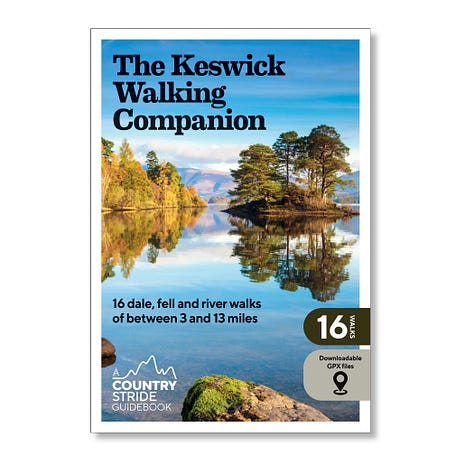
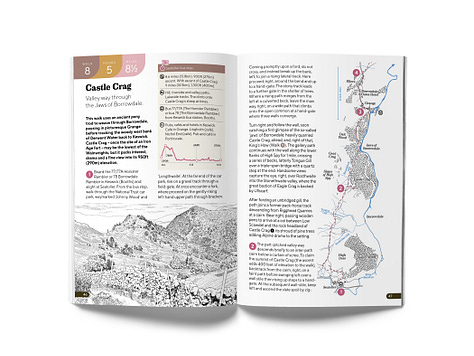
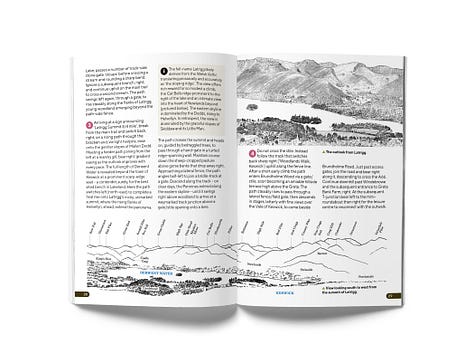
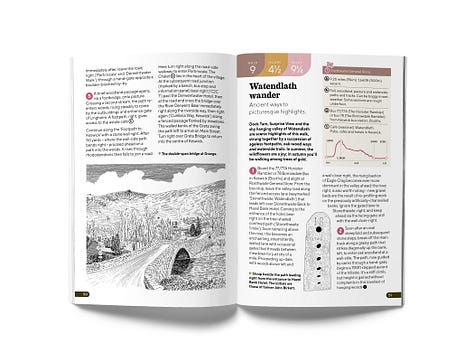
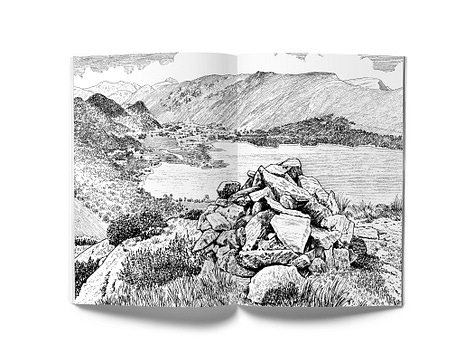
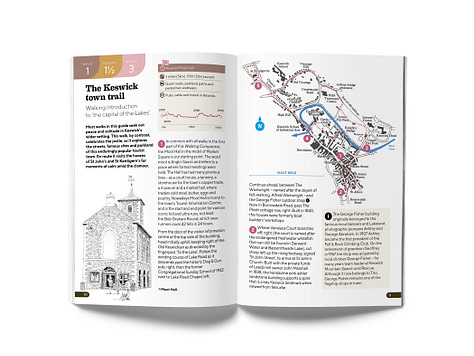
Explore the northern Lake District with 16 unique walks of between three and 13 miles.
Routes from Keswick, Buttermere, Borrowdale, Thirlmere and Bassenthwaite.
Discover dramatic valleys, ancient woodlands, much-loved lakes and little-walked old ways with Fellranger author Mark Richards.
Visit the iconic honeypots of Ashness Bridge, Castlerigg Stone Circle, Latrigg and Surprise View.
Ascents of Cat Bells, Walla Crag, Skiddaw, Castle Crag, High Spy, Causey Pike and more.
From short strolls to full-day expeditions.
Notes on buses, boats, parking, pubs and cafés.
Includes heritage highlights, detailed mapping and downloadable GPX routes.
50p from every copy sold is donated to CATMHS to fund information boards celebrating Keswick’s industrial history.
This guidebook is published by Dave and Mark from the Countrystride podcast.
For more about the Keswick Walking Companion, see inspiredbylakeland.co.uk/products/the-keswick-walking-companion




